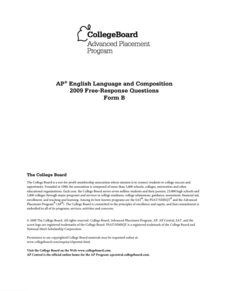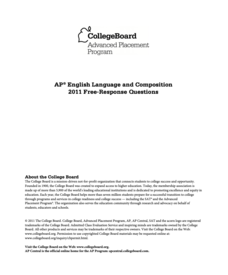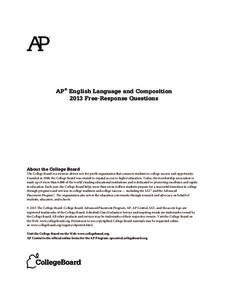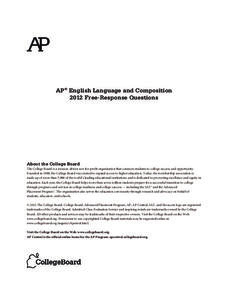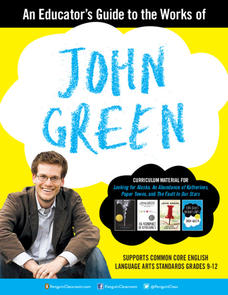Literacy Design Collaborative
The Sunflower: The Possibilities and Limitations of Forgiveness
After reading Simon Wiesenthal's The Sunflower, pupils form opinions either for or against forgiveness as well as analyze Wiesenthal's choice about forgiving. Before completing their essays, learners participate in class discussions...
Literacy Design Collaborative
The Scarlet Letter and Hester Prynne
Is Hester Prynne a virtuous woman? To conclude a unit study of Nathaniel Hawthorne's The Scarlet Letter class members craft an argument essay in which they use the standards listed in Proverbs 31 from the Bible to judge Hester's virtues.
College Board
Calculations Aren't Enough!
Unlike mathematics, statistics comes with a context. The author reminds teachers that data analysis involves using the context to make sense of the numbers. The article stresses good communication skills by highlighting the scoring...
College Board
Teaching Students How to Write AP Statistics Exam Responses
But this is math—we don't need to know how to write! The article makes a point that class members in AP® Statistics should be comfortable writing as the exams require it. Individuals quickly realize that quality writing is crucial...
US National Archives
Eastern Europe 1939-45 — Ukraine
Was Joseph Stalin desperate or exaggerating the USSR's need for assistance on the Eastern Front in 1942? History students examine two differing opinions on Stalin's position and the reality of the Eastern Front just three years before...
The New York Times
Where to Draw the Line: Balancing Government Surveillance with the Fourth Amendment
The question of how to balance Fourth Amendment Rights with national security concerns becomes critical in an age of planned terrorist attacks, election interference, and fake news. Get young social scientists involved in the debate with...
College Board
2009 AP® English Language and Composition Free-Response Questions Form B
In writing, an argument can be considered valid if writers have evidence to support it. Free-response questions from the AP® English Language and Composition exam ask writers to craft three argumentative essays. One prompt asks test...
College Board
2009 AP® English Language and Composition Free-Response Questions
Exploration comes at a cost. A set of questions designed for the AP® English Language and Composition exam includes an argumentative prompt about the cost of space exploration. Writers review sources to develop their position before...
College Board
2010 AP® English Language and Composition Free-Response Questions Form B
Although the United States observes Daylight Savings Time, many countries decided against it. A free-response question, part of a set of sample questions from the 2010 AP® English Language and Composition exam, has writers consider the...
College Board
2010 AP® English Language and Composition Free-Response Questions
Humorists do more than tell jokes; they also impart key messages about society. A series of free-response topics from the AP® English Language and Composition exam cover three topics, including one discussing the role of humorists....
College Board
2011 AP® English Language and Composition Free-Response Questions Form B
Strong writers support their points with direct evidence and details. A series of free-response questions from the 2011 AP® English Language and Composition exam require the use of details to obtain a good score. The first prompt...
College Board
2011 AP® English Language and Composition Free-Response Questions
Mammals can be carnivores, omnivores, and herbivores, but what about locavores? A set of free-response questions from the 2011 AP® English Language and Composition exam introduces test-takers to the term, which describes people who try...
College Board
2013 AP® English Language and Composition Free-Response Questions
In 2011, the Martin Luther King, Jr. Memorial opened in Washington, DC to much praise and some criticism. Part of a series of response questions from the AP® English Language and Composition exam, writers consider what factors...
College Board
2014 AP® English Language and Composition Free-Response Questions
For some students, college may not be worth the cost. Free-response questions from the 2014 AP® English Language and Composition exam cover a variety of topics, including the value of a college education. Writers review six sources to...
College Board
2016 AP® English Language and Composition Free-Response Questions
When it comes to testing, practice makes perfect. A set of free-response questions from the AP® English Language and Composition exam help writers prepare for the test. Three different prompts cover topics such as monolingual English...
College Board
2017 AP® English Language and Composition Free-Response Questions
In the age of the Internet, are libraries still important? A collection of sources, part of a set of sample free-response questions from the AP® English Language and Composition exam, discuss that question. A variety of sources,...
College Board
2012 AP® English Language and Composition Free-Response Questions
Neither rain nor snow nor heat nor gloom may keep postal workers from delivering the mail, but is their livelihood sustainable? A question about the USPS makes up one of the three items in a series of free-response questions from the...
College Board
2015 AP® English Language and Composition Free-Response Questions
Many schools have honor codes, but scholars do not always choose to follow them. As part of a series of free-response questions from the AP® English Language and Composition Exam, learners discuss the benefits or disadvantages of honor...
College Board
2018 AP® English Language and Composition Free-Response Questions
Discussions of eminent domain sometimes trigger strong emotions. A set of free-response questions from the 2019 AP® English Language and Composition exam tackles the concept with a series of persuasive pieces. Learners analyze all six...
Penguin Books
An Educator’s Guide to the Works of John Green
The novels of John Green cover the gamut of teenager emotions. A guide to his works provides classroom lesson plans for the novels Looking for Alaska, An Abundance of Katherines, The Fault in Our Stars, and Paper Towns. Each...
Benjamin Franklin Tercentenary
From Ben’s Pen to Our Lives
What would Ben do? Jumping off from the pseudonymous letters Ben Franklin fooled his older brother into publishing when he was still a teenager, young literary lovers dive into acting, writing, and addressing a local issue with wit and...
Benjamin Franklin Tercentenary
Reading the Work of B. Franklin, Printer
Placing Ben Franklin’s ideas about a free press next to those embodied in the First Amendment sheds light on both. Learners interpret and compare two primary sources and then examine them in the light of a contemporary survey about...
Newseum
Editorials and Opinion Articles
Reading the news is fun, and that's a fact! With the lesson plan, scholars differentiate between fact and opinion as they read editorial articles. They complete a worksheet to analyze the information before writing their own editorials...
Aurora City School District
Do Not Try to Kid a Kidder: The Art of Persuasion
The power to convince others of your argument lies in your knowledge of rhetoric! A thorough packet covers the basics of persuasion, including logical appeals and fallacies, and applies strategies to letters to the editor,...








